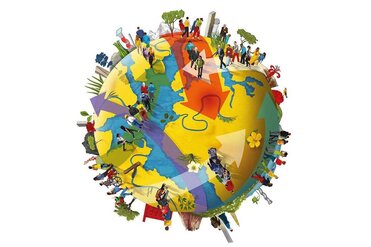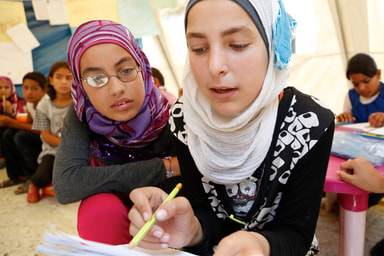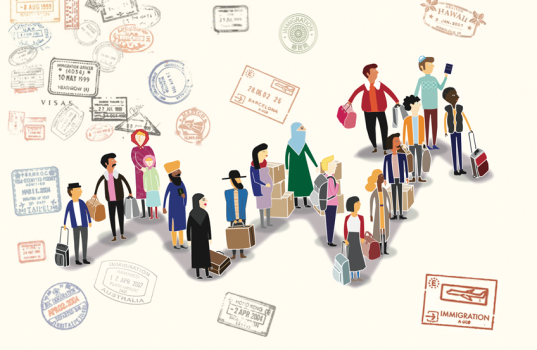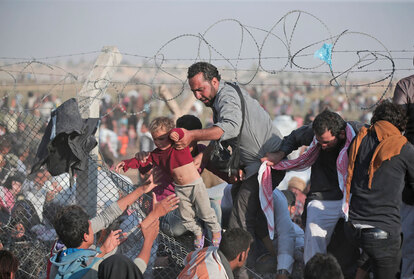Beyond the 'Refugee Crisis': ReFugees in Turkey and Global Public PolicyThe course offers a deep immersion into the processes, challenges, and impacts of designing public policies for Syrian refugees and their host communities. Taught in SIPA’s innovative Global Immersion format, it is based in Istanbul and Gaziantep and involves on mixture of seminar-style discussions, interactions with UN and civil society experts, site visits, and a role-play simulation on refugee camps. Bringing together legal, sociological, and development perspectives, the course advances participants’ understanding of how different actors in Turkey have established legal and policy regimes with regard to healthcare, education, and labor market participation. The course addresses the role of multilateralism, international relations, and international and regional cooperation, as well as links to humanitarian and development discourses, including the Sustainable Development Goals.
|
Migration and HUMAN developmentThis course introduces students to the key notions, norms, and narratives of international migration from economic, sociological, legal, policy, international relations, and normative perspectives. Students learn about transnational livelihood strategies and channels through which migration and migrants can enhance human development especially in their countries of origin, while creating better opportunities for themselves and contributing to their communities of destination. This includes in-depth discussions of the determinants, flows and effects of emigration, immigration, return, financial and social remittances, and diaspora investment.
|
Global Governance: Climate Change & Migration

The course introduces students to the key notions, levels, and forms of global governance regimes. It goes beyond international relations theories to provide a variety of theoretical and practical perspectives on global public goods, global public policy, and multi-level governance. It will thus highlight interlinkages between global-level interventions and regional, national, and local activities and outcomes.
Whereas global governance regimes cover a wide range of issues, this course deliberately focuses on two sample areas: climate change and migration/refugees. While the linkages between climate change and mobility will be discussed, the course focuses on these two issues separately. The discussions will shed light on different institutions, actors and actor constellations, as well as the effectiveness, representativeness, and coherence of multilateral regimes. Students will engage with key questions and analytical categories to approach global governance issues and the role of international law, goal setting, platforms, and frameworks. While the course has a specific focus on climate change and migration it aims at creating a broader understanding of global governance issues.
In addition to critical scholarship on global governance, the course relies on students’ primary analysis of relevant proceedings at the UN, original policy documents, as well as expert testimony from a range of guest lecturers, who share their extensive first-hand observations as participants and actors of global governance processes from the United Nations, NGOs, think tanks, and academia. By these means, Global Governance: Climate Change & Migration offers insights into the processes, challenges, and impacts of different regimes and aims at enhancing participants’ understanding of how to make global governance regimes stronger, more effective, and accountable.
Whereas global governance regimes cover a wide range of issues, this course deliberately focuses on two sample areas: climate change and migration/refugees. While the linkages between climate change and mobility will be discussed, the course focuses on these two issues separately. The discussions will shed light on different institutions, actors and actor constellations, as well as the effectiveness, representativeness, and coherence of multilateral regimes. Students will engage with key questions and analytical categories to approach global governance issues and the role of international law, goal setting, platforms, and frameworks. While the course has a specific focus on climate change and migration it aims at creating a broader understanding of global governance issues.
In addition to critical scholarship on global governance, the course relies on students’ primary analysis of relevant proceedings at the UN, original policy documents, as well as expert testimony from a range of guest lecturers, who share their extensive first-hand observations as participants and actors of global governance processes from the United Nations, NGOs, think tanks, and academia. By these means, Global Governance: Climate Change & Migration offers insights into the processes, challenges, and impacts of different regimes and aims at enhancing participants’ understanding of how to make global governance regimes stronger, more effective, and accountable.
GLOBAL REFUGEE REGIMESThe course furthers participants’ understanding of how refugees and other categories or migrants are conceptualized, as well as why and how responses are securitized. Examining the social worlds of refugees in different scenarios in the global North, as well as in the global South, the course elaborates on the different policy and legal regimes in both, the international and the domestic spheres. The latter include regimes that aim at immigration control and deterrence, immigrant integration, and refugee protection, but also at establishing refugee camps and promoting voluntary repatriation or resettlement.
|
MOBILITY AND FORCED MIGRATIONThe course engages in discussions on the commonalities and differences between various forms of spatial mobility from legal, sociological, and normative perspectives. It furthers participants’ understanding of how forced migrants—including refugees and IDPs—and so called voluntary migrants are conceptualized, as well as of the different policy and legal responses in both, the international and the domestic spheres. The latter include policies aiming at immigration control, immigrant integration, and refugee protection.
|




